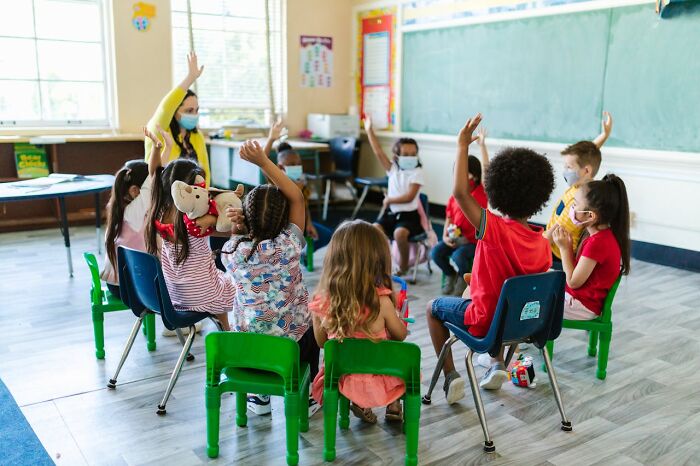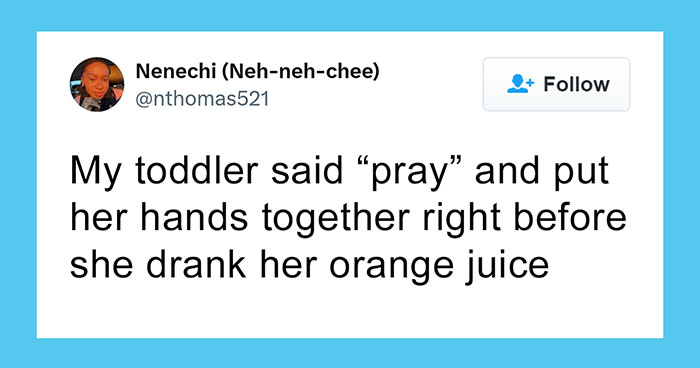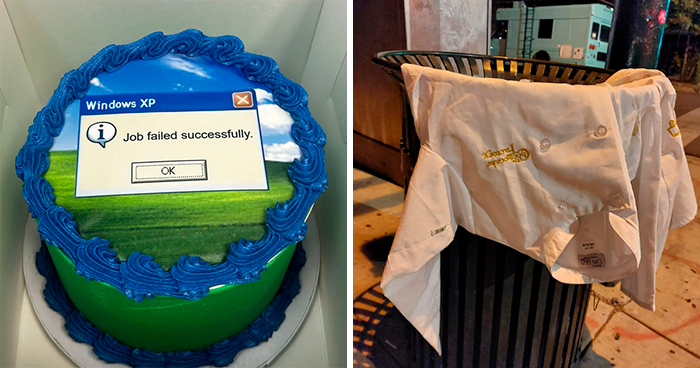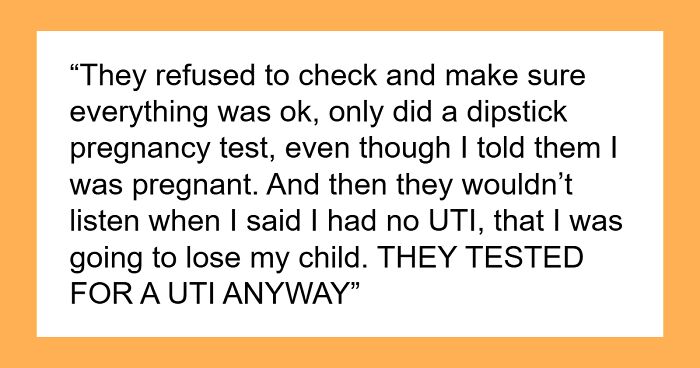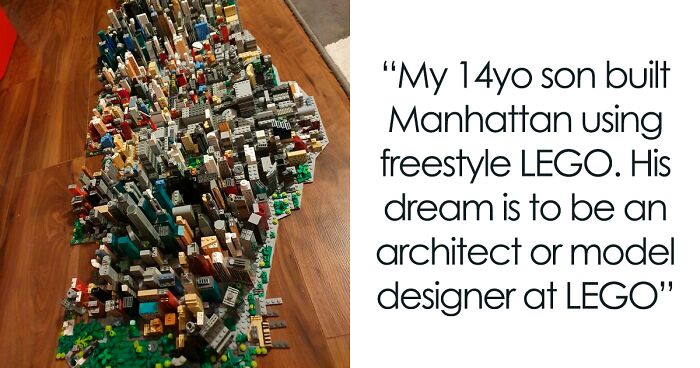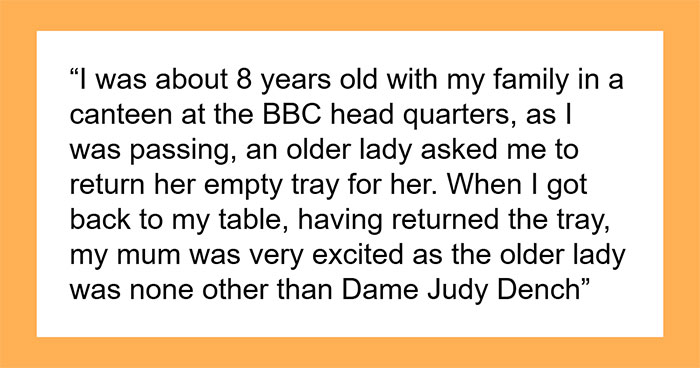A teacher's job is priceless in many ways, yet it is highly undervalued in today's society. According to a 2022 survey, less than one in five teachers would encourage a young person to pursue a career in education.
And you don't have to look far to find the reasons. Low salaries are reason enough: the gap between the weekly wages of teachers and college graduates working in other professions grew to 26.4% in 2022. These are record numbers, considering the gap was only 6.1% in 1996.
Teachers are the people shaping the next generation, so we should hold their jobs in high regard. However, the teacher-student relationship can sometimes go both ways. At least, this is what this person had in mind when they started this Quora thread. They asked: "As a teacher, what is the harshest truth a student has ever taught you?"
Many educators shared the unexpected life lessons they got from their students, proving that a kid can teach a teacher something new about the world and life as well.
This post may include affiliate links.
 That I am not the unbiased person I thought I was.
That I am not the unbiased person I thought I was.
Let's call him Bubba. He was in a required freshman year experience class that all faculty rotated teaching. I normally teach statistics and research methods.
Students are required to write a paper on any topic, as a method of our gauging their knowledge of things like APA style and that a sentence begins with a capital letter and ends in some form of punctuation. This assignment allows us to intervene early with students who simply cannot write and refer them for tutoring in their first semester.
Bubba sat in the back of the room, cowboy hat tipped down, boots on the chair in front of him, chewing tobacco. Never said a word.
The title of his paper was something like "The Use of Allegory and Metaphor in the Works of John Steinbeck."
I assumed he had copied or paid for it. There was no way this kid wrote it. I consulted a senior professor about what to do and she said, "Invite him to your office to discuss it. If he wrote it, he'll be flattered. If he didn't, he'll be busted."
So, I did. Bubba tips back his hat, looks me in the eye and says,
"Well, ma'am, when I was on the rodeo circuit, my partner gave me this book, The Red Pony, because I had to do a school book report and since it was about a horse, me and him figured it would be good. When I read it, though, it was about a lot more than a horse .... "
Bubba went on at great length about all of Steinbeck's books that he had read and what they meant to him personally.
I was SO glad I had followed the advice to ask him about his paper instead of accusing him of cheating, and did I ever feel like an idiot!
 There was a young woman in one of my college classes who was frequently late. It happened often enough that it became irritating and even mildly disruptive. One day, I decided to put an end to it, and asked her to stay after class a few minutes so we could chat.
There was a young woman in one of my college classes who was frequently late. It happened often enough that it became irritating and even mildly disruptive. One day, I decided to put an end to it, and asked her to stay after class a few minutes so we could chat.
Just as I was about to launch into a long lecture about the importance of being on time in the business world, she apologized about the frequent lateness. Then said, “I’m at my wit’s end, my mother is dying of cancer and can’t be left alone. The day-care person is sometimes late, and I can’t leave earlier because of other responsibilities.”
When she told me that, the few minutes she arrived late didn’t seem that important by comparison. We made a deal; she could come late when she needed to, and would not speed to get there. Another classmate and friend was already catching her up on anything covered before she got there. When she arrived late after that, I greeted her with a nod and a smile. She was able to resolve the day care issue shortly afterwards.
Lesson learned: We never know what burdens people are carrying. We should give people the benefit of the doubt and get the facts before assuming they are lazy, insincere, or purposely doing something to annoy us.
Yep. My mom's been fighting the big C for a few years now, it's finally coming to an end. I'll be bringing her home to die here soon.. I can barely stand to cook or clean after a visit in the hospital so I applaud this person for doing anything, nevermind going to school. Its more than I'm managing
 Going anonymous as this is about my students, however real names are not used.
Going anonymous as this is about my students, however real names are not used.
I’m a maths teach at a local secondary school in an area where most students live off benefits. I had one girl, Daisy, who was highly intelligent, we did an iq test and her score was in the 140s.
One day I asked her if she was going to university, no was her answer, I was puzzled, she excelled in class and had a keen interest in maths and science. She was proud too, wearing her maths and science award badges everyday.
I asked her why, here was her response.
‘I can’t afford it’
Me:’you can get scholarships and grants’
‘It’s not that, trust me I’ve checked, it’s the living costs.’
That’s when I realised, this girl was 12 and knew she couldn’t progress further than college, not due to lack of talent or enthusiasm, due to money. I sat down with her, she cried all of one lunch in year 11, I cried to, at her potential wasted beyond belief, maybe the most talented student I’ve ever taught, not able to advance.
I started a fund for all the children like her, unable to attend university due to money, and it worked. I raised enough to put her though and support her family, I’ve put other though uni too.
I learnt that money is a problem and a worry for 12 year old girls but I also learnt talent can’t be wasted, children like her need a way to succeed.
I hope I gave that to her, she now works as a medical researcher and was given the life she never thought she’d have.
Wow, this is sad but uplifting. It's awful that education is something that people have to pay for in some countries. I've always thought that all education should be free for everyone. (Edited for clarity)
 School is not the most important thing in every student's life.
School is not the most important thing in every student's life.
Early in my career, as an idealistic, demanding history teacher, I had a student (10th grade, so 15-16 years old) who was struggling to keep up with her homework and was at risk of failing. I berated her one afternoon for continuing to come up with excuses and for continuing to ask for extensions and not meet my expectations.
I happened to catch her on the news later that week testifying in front of the state legislature, in support of a bill that would protect victims of sexual abuse. The bill carried her name.
Taught me a small dose of humility and a large dose of humanity.
Typical idiot, berating and attacking a kid instead of finding out what was going on. I got a student to tell me what she was playing hooky, turned out her mother beat the sith out of her regularly.
 I knew a student, who was a wonderful young man. Everyday, he came to school prepared, dressed (in his school “uniform”) and was a pleasure to to have in class according to his teachers.
I knew a student, who was a wonderful young man. Everyday, he came to school prepared, dressed (in his school “uniform”) and was a pleasure to to have in class according to his teachers.
One day he was sent to my office by one of his teachers because he wasn’t wearing his school “uniform” ( blue polo shirt and khaki or blue pants). I asked him why he didn’t have on his uniform and he said his mother had not had a chance to do laundry.
Having heard that (excuse) hundreds of times, I told the young man that I needed to speak with his mother to confirm his story. He noted that her phone wasn’t working but she would be there to pick him up after school. I told him that I would talk to his mother after school and sent him back to class with a PE shirt to wear (school policy).
At 3:00 sharp, he came to my office and informed me his mother was outside waiting. I walked outside with him and went over to the car. As I neared the car I noticed that it was full of clothes, bags, etc. His mother immediately started apologizing for all the “junk” in the car, explaining that they were in the process of moving. She also apologized for not having a working phone.
When I inquired about his uniform, his mother looked ashamed and said, “I’m really sorry about his uniform, but we are actually between shelters and have been living in the car for about a month.” It turns out they were homeless, hungry, using the restroom at a nearby park to bath, etc. But still he came to school, ready to learn, every single day!!!
I learned a powerful lesson that day about courage, tenacity, and class!!
PS. I referred them to the district (homeless) services department and they were able to find them shelter, food, etc.
 When I was teaching a high school class at an international school in Mexico, I thought I was superior to my students. I had a New England education, English was my first language. I had a solid moral background. There was little (I thought) that my students could teach me.
When I was teaching a high school class at an international school in Mexico, I thought I was superior to my students. I had a New England education, English was my first language. I had a solid moral background. There was little (I thought) that my students could teach me.
One day, just before class, a student, by the name of Nicolas, came and asked me if he could go to the bathroom. I told him yes, but to hurry back because class would begin in five minutes. He asked, "Don't I need a pass?"
Our principal was very strict and required every student to have a pass if he or she was out of class. I told him, "Just go! Hurry up back."
Then I began writing the lesson on the board.
He returned about ten minutes later looking very dejected. I asked him if he was okay and he said, "Yes. No problem."
So, I continued with the lesson. But at the end of the period as students were leaving, I noticed he still looked dejected.
"You okay, Nick? You look depressed."
He replied, "Well, I got put on detention by the principal for being in the hall without a pass."
"But didn't you tell him that I advised you to go ahead without one?" I asked.
"No," he replied.
"Well, why on earth not?" I asked exasperated.
"Because I didn't want you to get in trouble, sir," he replied.
I realized then that here was a student who was superior to me in sensitivity and caring. I could never have imagined doing such a thing when I was a high school student. I was humbled. The incident showed me not to underestimate the existing values of those whom I presumed to teach.
I truly hope that OP went to the principal and asked for the detention to be overturned.
 I was a first year teacher with a 6th grade class. I had one very bright student who never did his homework. I tried everything but he simply came in most days with little or none of it done.
I was a first year teacher with a 6th grade class. I had one very bright student who never did his homework. I tried everything but he simply came in most days with little or none of it done.
I held him after class one day to finish it and he did in record time. I asked him why it was never done. He responded that he and his family were homeless. They were actually sleeping in the back of a station wagon and eating food they could scavenge and buy cheaply. They used public restrooms and parked wherever they could until they were told to move on. He told me he tried to do it at the library but mom had two other children to look after and she could not always arrange to get him there.
I told him he could stay after with me each day to complete his work in a warm, safe classroom. I would routinely stay late to complete my work and prep for the next day’s classes so it was not a problem for me to do this. I also made sure there were snacks and drinks for him. We struck up a friendship as I learned more about him and I decided to do what I could to help him and his family out.
I contacted my administrator who arranged for the family to get subsidized housing. They got it almost immediately but it meant a move to another town and school district. The superintendent handled those specifics.
A few days later, my superintendent paid me a surprise visit. I asked him if there was a problem. To my surprise, he pulled out a letter for me to read. This student wrote him personally with a request to finish out the year in my class. He stated that I was the first teacher who took an interest in him and genuinely cared about what would happen to him. I’m sure that’s not true but that letter really got to me. I had tears running down my face as I read it.
Unfortunately, he was not allowed to stay in my school and classroom as it was deemed to be unfair to the local taxpayers if he was found living in the neighboring town. However, by a twist of fate, he ended to in the classroom of the very teacher who mentored me during my student teaching. As she was still a friend of mine, I called her, gave her his background, and stated my concerns. She promised to personally look out for him.
A few months later, his family moved again and, at this point, I lost contact with him. I think of him even today and wonder how he finally made out. He had a tough life and I hope he eventually came through it in good shape.
This is actually one of the reasons I'm a care driver, so that children can be kept in the same school and not bounce around because of lack of housing.
 I was trying to rush through an explanation of a complicated physics concept before the bell rang, and the top student in my class raised his hand and said, "You know, just because you're up there teaching, doesn't mean we're learning."
I was trying to rush through an explanation of a complicated physics concept before the bell rang, and the top student in my class raised his hand and said, "You know, just because you're up there teaching, doesn't mean we're learning."
I'm sure many students have thought something like this in millions of classes around the world, but they don't say anything (it would almost always be terribly impolite). The only reason this student said it, and got away with it, is that he was my 16-year-old son.
So true. Almost all of my university professors are like this. And I study in a reputed institution. Maybe they are good researchers but they can't teach if their lives depended on it (oh well it does). We have a very very old Quantum Mechanics professor who would just mumble things to himself in class.We can't complain because everyone is scared to stand out and nobody would believe us ( believe me, I tried). Besides, curse of knowledge is very prevalent among seasoned academics.
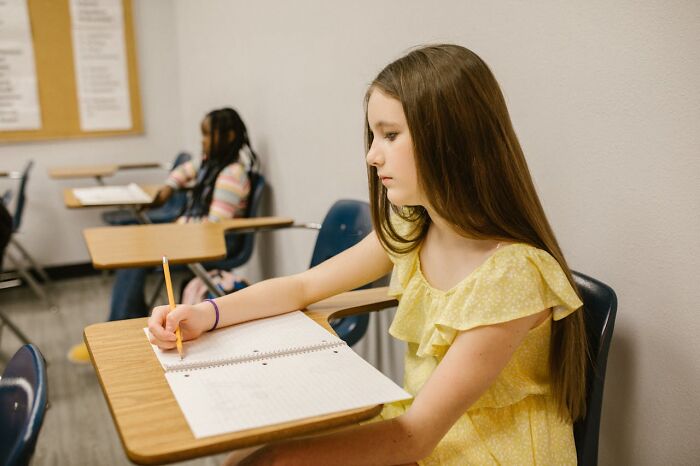 That you cannot always protect your pupils.
That you cannot always protect your pupils.
A 9 year old girl disclosed to me that she had been sexually abused by her grandfather. Her grandparents lived overseas and were due to arrive within days so that her own parents could go on a pilgrimage to Mecca.
She was terrified, not for herself alone, but for her younger sister who was of the age that she was, when first abused.
The courage it took for this child to disclose to me was extraordinary- she had never told anyone and would not have told anyone if it was not for her love for her younger sister.
As the designated person in the school for child protection I immediately alerted social services. They told me to inform the parents (as we, the school has an already existing relationship with them), which I did, but to make a (VERY) long story short, nothing was done and the parents went away on their pilgrimage and left both girls in the care of their grandparents. I tried everything to get the girls out of there including asking if they could stay with me, but was refused by social services and the family.
The parents moved the girls to another school shortly thereafter and said that they would take legal action against me if I ever contacted them again.
This was many years ago now, when I was a Deputy Head- about 26 or 27 years? I have never forgotten those precious girls and that lesson.
Educators, medics, police- we all suspect, see and are told about abuse, but the ‘rights’ of parents always come first- not the rights of children, sadly. It's a very sad truth and a hard lesson to learn.
This is sick and heartbreaking. If you're first instinct isn't to do whatever it takes to protect your children, you don't deserve to have them.
 Overall I may have learned more from my students over the years than they learned from me. The last school I taught in had a meaningful slogan; "We are a community of learners." Teaching is a great learning experience, but most of this learning isn't harsh.
Overall I may have learned more from my students over the years than they learned from me. The last school I taught in had a meaningful slogan; "We are a community of learners." Teaching is a great learning experience, but most of this learning isn't harsh.
There was a time when I learned more than I could have expected from a mistake I made with a student. She had been complaining about the same thing over and over again as class was to begin, and rather than calmly telling her that we could discuss this in private later, I suddenly lost it and loudly and angrily yelled at her. She slumped to her seat, and I started the lesson in front of a stunned class.
Suddenly I realized that I had grossly overreacted and that no one was going to learn anything about physics that day. I had to own my mistake. I walked up to the girl, who sat in the middle of the class on my left side and told her that I apologized and that nothing she did justified the way I treated her.
I assumed that I would lose the respect of the class by apologizing in this way, but the exact opposite happened. They respected me more than ever before, and things were learned about physics that day, but that was the least of what was learned.
I learned that a sincere apology when wrong is an essential part of working well with people and that when this becomes part of a culture, an authentic community is developed. Whether or not, as Gibbs says on NCIS, apologizing is a sign of weakness, apologizing makes a person stronger.
 It was my second year teaching. I had a young man in my seventh period class (though at the time it was called “I” period). College-prep twelfth-graders. He was a very nice guy. Personable. Bright. Hard-working. I am very sorry that, 40 years later, I do not remember his name.
It was my second year teaching. I had a young man in my seventh period class (though at the time it was called “I” period). College-prep twelfth-graders. He was a very nice guy. Personable. Bright. Hard-working. I am very sorry that, 40 years later, I do not remember his name.
A month or two into the school year, he started being absent. The absences increased. I would get requests for homework, I would get completed work to grade, and once in a while the kid would come to class. Right after Christmas vacation, another teacher comes in to tell me that he was on permanent homebound instruction, and she was his instructor. Would I please keep her up to date on everything we were doing in class and provide her with all the necessary books, materials, etc.
Turns out he had leukemia. The last several weeks he was on homebound, his lessons were delivered to him in the hospital.
He died before his class graduated.
I was always impressed that even though he knew he was dying and probably realized that he would never live to receive a high school diploma or “use” anything he learned in school, he never quit. He never just said “What’s the use?” and lay back to die.
That was a powerful lesson for a 23-year-old kid who was barely two years out of college.
I think perhaps he should have. "Quitting" is such a weird concept, we shame quitters when really it only means that you stopped wasting your time on something. *Sometimes* it's because you think you can't succeed, when you could have if only you had kept going, but more often it's just that you see something more valuable to you. Normalize saying "I can do that, but should I?" He could have spent his last months with his family and friends.
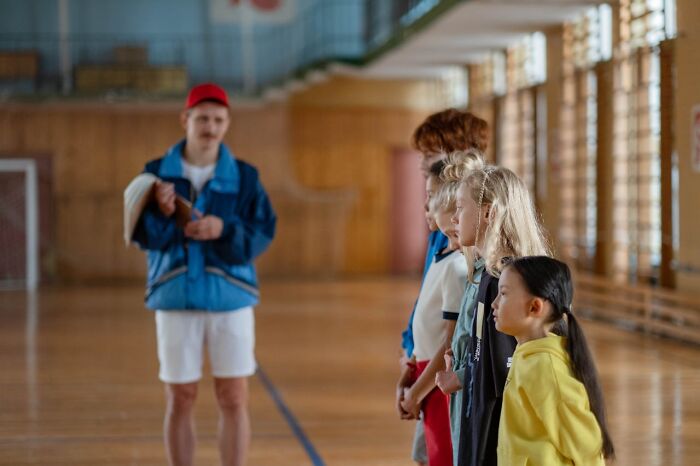 One day I was getting very angry at the 2nd girl who was “my difficult child” who was refusing to get into line because she was sure that somebody had stolen a coloring she had made for her mom. She was yelling “I'm not going to see her for 2 more weeks.” Other students tried to calm her down by saying, “I haven't seen my mom in 2 years. My dad went back to Mexico and can't come back; I don't even know when I'll see him again”. I sat back thinking I'm mad because they won't get in line for gym. My reality is so far from theirs, how can I teach them? and I was never able to teach them in the same way again.
One day I was getting very angry at the 2nd girl who was “my difficult child” who was refusing to get into line because she was sure that somebody had stolen a coloring she had made for her mom. She was yelling “I'm not going to see her for 2 more weeks.” Other students tried to calm her down by saying, “I haven't seen my mom in 2 years. My dad went back to Mexico and can't come back; I don't even know when I'll see him again”. I sat back thinking I'm mad because they won't get in line for gym. My reality is so far from theirs, how can I teach them? and I was never able to teach them in the same way again.
On a rainy Tuesday afternoon, my first grade students were roaming about the classroom, choosing activities as they saw fit for themselves.
Since the students were busy I took the opportunity to straighten my desk.
About ten minutes in, I noticed Niko was next to me with a pile of crumpled papers. I stopped what I was doing and looked at him. He was still mashing and crumpling papers into balls.
I said, "Niko, I'm cleaning up my desk. And I think you know where that pile of paper balls goes." I pointed at the trash can in the corner.
He looked at me with his green eyes wide, "But Kathy, this isn't trash!"
"No?"
"No! These are origami rocks. I'm making you a rock garden!"
Its all matter of perspective. I no longer see crumpled papers the same way.
 My wife and I call it the Anthony Chen response, named for the brilliant ninth grader who enlightened me. In an informal conversation before class, I was complaining about the stupidity of the actions and thinking of some group—I honestly don’t remember what we were talking about—and Anthony said, “Remember, Mr. Hays, half the world is below average.”
My wife and I call it the Anthony Chen response, named for the brilliant ninth grader who enlightened me. In an informal conversation before class, I was complaining about the stupidity of the actions and thinking of some group—I honestly don’t remember what we were talking about—and Anthony said, “Remember, Mr. Hays, half the world is below average.”
The simple, obvious and horrible truth of the statement—something I’d never considered—overwhelmed me. I actually had to sit down and think after he said it. Now when either my wife or I are complaining about the idiocy of someone’s or some group’s (usually political) behavior, the other might say, Remember Anthony Chen!
Well, half of the world is below the median, to be pedantic about it.
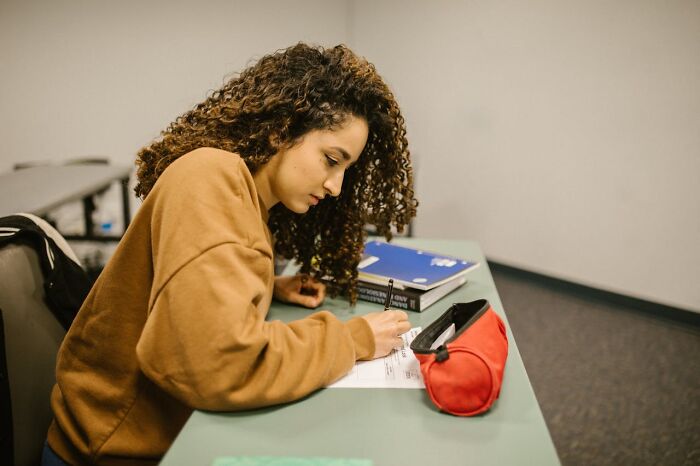 One day a student walked into my class at the beginning of the period and stood in front of my desk. She said, “I have no idea who you are.”
One day a student walked into my class at the beginning of the period and stood in front of my desk. She said, “I have no idea who you are.”
It took me a second to realize she wasn’t playing around. She had had a seizure that morning and was still recovering her memory. In spite of this, the student preferred to go to school and participate in her daily routine than stay at home. She got from class to class for the first half of the day with the help of her friends, whom she could recognize, even though she didn’t yet remember their names.
At the beginning of the school year, this student had written me a note on her first homework assignment. The note was a response to some kind of rallying cry I had made—I had said something like, “All of you are capable of getting A’s in this class, and I hope that all of you will.” This student wrote, “I just want you to know that I’ll try my best, but I’m not smart and I’m not going to be able to get an A in this class.”
The reason this student made such an impression on me is that she really was bright. She was quite smart. And so I pushed her, I encouraged her, I did everything I could to help her learn and succeed. But she just had one of those lives where everything keeps going wrong. A month or so after she had this seizure, her father died suddenly. The student was in and out of school for the rest of the year, and ended up receiving an incomplete in most of her classes—and so she was right. She didn’t get an A.
The harsh truth I learned was that even when both the teacher and the student mean well, and pour everything they have into furthering the student’s education, there is a ton of crap that can get in the way. Sometimes you just have no control. And maybe all the effort, and thought, and positive energy you put into that student will make a dent in their life, but you as the teacher do not get to change the life of every student. Sometimes you do not even get to choose which students you help. There are forces at play that are much, much bigger than you.
That student may well look back and remember that OP cared enough to try. Sometimes that's what counts, especially during hard times.
 I had a student who came into my history class and told me how she hated history, hated me, and did not want to be there. She then said I am a black lesbian, EFF YOU whitey. I looked at her the class hearing this was not sure what or how I would react. I smiled and said, so does this mean we are not going to have lunch later. She looked at me as if to say something profound but just shook her head. Silence was deafening for a few minutes. It was our first day of class, I said my job is not to make you love history but my job is to assure that you have a basic historical understanding. I will make a deal with all of you, give me three classes, if you do not like what you are hearing, seeing, reading, or learning drop the class, add another class. But I ask you keep an open mind. We have a class section called stump the prof, its your turn to ask me history classes. It has to be related to American history is the only catch.
I had a student who came into my history class and told me how she hated history, hated me, and did not want to be there. She then said I am a black lesbian, EFF YOU whitey. I looked at her the class hearing this was not sure what or how I would react. I smiled and said, so does this mean we are not going to have lunch later. She looked at me as if to say something profound but just shook her head. Silence was deafening for a few minutes. It was our first day of class, I said my job is not to make you love history but my job is to assure that you have a basic historical understanding. I will make a deal with all of you, give me three classes, if you do not like what you are hearing, seeing, reading, or learning drop the class, add another class. But I ask you keep an open mind. We have a class section called stump the prof, its your turn to ask me history classes. It has to be related to American history is the only catch.
She would ask me questions every class and they showed an understanding that I admired. She was not afraid to express herself, she was not polished, she was blunt and to the point. We watched a documentary on the Triangle Coat Factory Fire in the 1900s and said with a sadness in her voice, Prof that could have been me or any of us girls in this class. What she taught me is we all can change and become a better self. Her willingness to see these young dead women in caskets due to neglect made her realize it could have been her. She changed from a angry young woman to a stronger empathetic history lover.
It was the Triangle Shirtwaist Factory. Sounds like the teacher got stumped on that one.
 I already knew this but one student brought it home. Students come to your class with their own set of problems. I had many students from the Oakland area. I could almost always identify these students based on their writing. Usually it was far below the standard. Most of them had identifiers that were typical of second language students. I had one student, however, who didn’t display any of these identifiers. In fact, he wrote an essay and read it in class that was so good several of the other students were in tears. I was in tears. Within two classes after he read his essay, he disappeared. This happens often, so while I was disapointed, I wasn’t surprised. Then he returned the next semester. He came late, left early, and missed classed often. Then he called me. “Ms. Fox,” he said, “I want to explain to you. I have panic attacks in class. I want to come. You’re a great teacher, but I… I don’t know. I just panic and want to run. I watch the door and I need to run.”
I already knew this but one student brought it home. Students come to your class with their own set of problems. I had many students from the Oakland area. I could almost always identify these students based on their writing. Usually it was far below the standard. Most of them had identifiers that were typical of second language students. I had one student, however, who didn’t display any of these identifiers. In fact, he wrote an essay and read it in class that was so good several of the other students were in tears. I was in tears. Within two classes after he read his essay, he disappeared. This happens often, so while I was disapointed, I wasn’t surprised. Then he returned the next semester. He came late, left early, and missed classed often. Then he called me. “Ms. Fox,” he said, “I want to explain to you. I have panic attacks in class. I want to come. You’re a great teacher, but I… I don’t know. I just panic and want to run. I watch the door and I need to run.”
I didn’t understand why, but I wanted to help, so I promised him he could have a seat by the door and that we would leave the door open at all times. He could step out whenever he needed. He could leave whenever he needed. I also offered to go with him to speak to his counselor to see if there was some other way I could help him. He agreed.
We went to the meeting and he explained. He talked about being the little guy in a gang-filled neighborhood. He talked about being teased in school. He talked about being physically handled by teachers. He talked about being afraid that his mother would drop him off on a doorstep because that’s what other mothers did. He talked about his own amazing mother who took these doorstep children in.
And I understood. This young man was suffering from post traumatic stress disorder from the treatment he received in school.
School is not a safe place for everyone.
I never saw this student again. I had his number and called to check on him, but it was disconnected. The really sad thing is that he was an exceptional writer who had a story to tell that could have potentially changed education for many people who have suffered the abuses that he suffered, and he had the ability to tell his story. He could write in a way that brought tears.
The harshest truth is that education fails brilliant people.
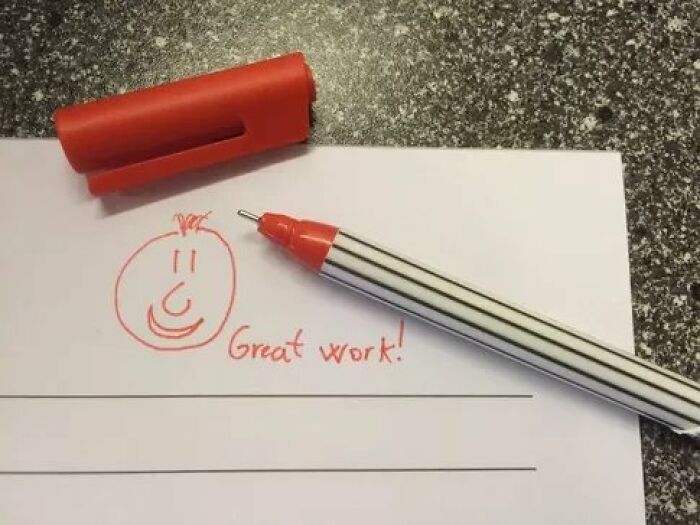 I haven't got anything as life changing as some of the other answers here, but still this made me reconsider some aspects of my teaching.
I haven't got anything as life changing as some of the other answers here, but still this made me reconsider some aspects of my teaching.
I teach English as a second language in Norway. This happened in my first year of teaching.
I was a new English teacher and very conscientious and thorough in everything I did. It was Friday, and the last session of the week. I was teaching in a class of 15 year olds, and I was giving the students back some written work which I had graded, commented and very thoroughly corrected.
To give positive feedback is important!
One guy in my class got his work back. He was not a very diligent student, but had probably done the best he could. His English left quite a bit to be desired, and I had painstakingly corrected every smaller and bigger mistake in his work with a red pen (of course).
He got back his paper, looked at it with a tired glance and said so everyone could hear it.
"Gee, who has poured blood all over my paper?" (In norwegian: "Hvem ere som har blødd på stilen min a?")
With my back turned to the student, I just froze. I was delivering some other kid his paper, and I felt this kid's pain. Here he had done the best he could do, and I, stupid teacher, had to correct and show him everything that was wrong. How does that feel to a tender young man? Even if you are not tender at all, but full of pimples and 6 feet tall? That has got to hurt. Of course it does. Is it any wonder that many students just look at their grade, and then throw their paper in the bin?
After that I don't usually correct every mistake. Especially if the student has a lot to work on. I try to find a few things to focus on for each kid, and also to focus on what's good in the work they've done. Sometimes that is difficult, but I owe it to this student. (And every other student as well.)
And of course, I will never again correct any student's work with a red pen. I use a green one instead.
Honestly I kinda like it when I've done a test and a teacher actually puts the correct answer and explains why my answer is wrong. When they just put a cross through the mark it just feels awful because it's like they don't even care enough to tell me what the mistake was
 While handing out the literature list for the upcoming year of high school, I casually asked the students in my class what they thought about it. One girl raised her hand and said: "Are you at all surprised we don't read but watch tv when teachers hand out these kinds of reading lists?"
While handing out the literature list for the upcoming year of high school, I casually asked the students in my class what they thought about it. One girl raised her hand and said: "Are you at all surprised we don't read but watch tv when teachers hand out these kinds of reading lists?"
The list was full of English literature they couldn't possibly understand regarding their proficiency levels and I suddenly remembered being discouraged myself when I had to read books like these while in high school.
I made an appointment with the headteacher, took this student with me and tried to persuade him to get rid of the obligatory reading lists.
During the next week's lesson, I told the classes they could choose three of their own books. They did great during the oral exams.
I remember feeling similar about my literature list in highschool, which I believe was pretty uniform throughout the country. Dutch literature, or perhaps all literature, has the tendency to be extremely bleak and depressing and in which the characters are either actively experiencing all kinds of extreme trauma OR they're the ones who're putting others through that trauma. Usually there's also some type of sexual perversion involved. It's never just a story, it's like it always has to be as decrepit as possible. I hated it. I wanted to read fantasy, but that wasn't considered 'literature'.
 In the final year of my 6 years of teaching Masters and PhD students, I had a student come up to me after class and kindly suggest that there was a much better way to approach the coding example I had just provided and showed me on my computer. I realized then that our skills are only good for at most 5 years. After that, all skills are obsolete.
In the final year of my 6 years of teaching Masters and PhD students, I had a student come up to me after class and kindly suggest that there was a much better way to approach the coding example I had just provided and showed me on my computer. I realized then that our skills are only good for at most 5 years. After that, all skills are obsolete.
 Shortly after my divorce, I was teaching reading in 6th grade. I was unhappy but going through the motions of teaching the best that I could. I was tired after school and less than a model parent to my own two children.
Shortly after my divorce, I was teaching reading in 6th grade. I was unhappy but going through the motions of teaching the best that I could. I was tired after school and less than a model parent to my own two children.
One of my 180 students that year, Mark, a quiet and polite student, was only attending my first period class two or three days a week. He rarely did his homework and failed most of his tests. At a conference with his other core teachers, I was not surprised to find out that he was failing his other classes as well. As a teaching team we called a parent teacher conference. We were hoping to work together with Mark’s parents in an effort to help Mark’s attendance and motivation.
The conference was scheduled for 7:15am in the morning before school. Mark’s father came in smelly, unkempt, extremely overweight and drunk. His mom had left the family with no notice or word of if she’d ever return. Mark’s father was explosive, miserable and ready to punish Mark harshly if he didn’t improve. Quite frankly, I was a little afraid for Mark.
After the conference I asked Mark to come to class just to talk for a minute. After starting the class and assigning a task for the other students, I called Mark to my desk and told him that I was sorry for his situation and hoped things would get better for him. I asked him if he might find more peace at home by doing some of the things his father asked him to do.
Mark responded quickly, “Why? So I can be more like him?”
My harsh truth came instantly. I realized then that I needed to be a happier, healthier person to give my own kids a better example. Why would they want to do what I asked if they saw me as a miserable adult? Mark motivated me to become a happier adult and taught me how to be a better parent.
P.S. Thank you all for your questions of concern for Mark. I would love to tell you a happy success story for him. However, shortly after the conference, Mark and his father moved away from the school area. He didn’t stay in touch with me, any of his other teachers or any of the students. Sadly, I don’t know what happened to Mark. I wish this was an isolated incident but our schools are full of similar stories, especially in lower socioeconomic areas. In my opinion, this type of story won’t improve until parenting improves. Is there hope for advancing parenting skills?
 Nothing I do matters if the child is not ready to learn.
Nothing I do matters if the child is not ready to learn.
As captivating as I can be, when a child doesn't have a place to live, regular sleep, food, warm clothing, and LOVE; processing my words is impossible.
I can only control so much in a student's life.
I can make sure they eat breakfast and lunch, organize food/clothing drives, hug them and build them up, give their parents access to community services, and call CPS, but there is an awful lot of their life that I just cannot change.
I learn these over and over again, but they're heartbreakingly harsh each time.
Thank you for being there for the kids who needed someone to help them feel safe and secure.
 It was one of the most blatant cases of plagiarism on a term paper I have encountered in nearly a decade as a university professor.
It was one of the most blatant cases of plagiarism on a term paper I have encountered in nearly a decade as a university professor.
A student - a ‘business bro’ - was taking my theology class at a Catholic study abroad program in Rome. He, like many students, was there for the experience of being in Rome more than the classes. I’m used to them. They generally do enough work to get a C or a low B, but that’s it.
When it came time to hand in the paper for the term, he turned in a paper written by another student who took the same class previously. He changed the name and date and nothing else. I know this, because he left ‘track changes’ on, and when i opened the paper I saw not only his changes and the original student information, but also all of my comments and final grade from grading the previous paper.
According to school policy, I could either fail him the assignment, fail him the class, or recommend suspension from the university. I leaned toward him failing the class, but the dean and director of the program both preferred he just fail the assignment. So he did, got a D in the class, and passed.
A couple years later, LinkedIn recommended him as a connection. He was less than a year out from graduation and working as a consultant at some firm in some big US city. According to Glassdoor, he was likely making 3x my salary, in his first year.
He didn’t intend to, but that certainly underlined the fact that salary is rarely a good indicator of hard work, competence, integrity, or intelligence, and it always surprises me when people assume that it is.
The lowest paid staff often work far harder than the managers above them.
 I was teaching in a UK school and it was in a very rough area. There was a young girl of 11 whose parents didn’t have much, but she always looked happy.
I was teaching in a UK school and it was in a very rough area. There was a young girl of 11 whose parents didn’t have much, but she always looked happy.
I recall I was starting to become rather disillusioned with teaching and thought that there were better things I could be doing with my life.
One day, close to Christmas, I learned that this little girl had witnessed her father being shot and he died right there in front of her. I was mortified for her. Her mother came into school and said that because it’s so close to Christmas, she’d like to maintain the girl’s friendship groups and get her to share in the end of term fun with her peers, so she should remain in school. The school helped this happen in a very supportive way.
The girls was in my class. We’d got to the end of the activities and we were waiting, lined up, for the end of class bell. I asked what everyone was getting for Christmas.
“A BMX bike,” said one. “My mum’s getting me a Wendy house,” said another. The little girl’s hand went up in a shot and she had a gigantic smile beaming across her face and she said, full of the joys of Christmas, “I’ve asked Santa for a hoola-hoop,” she beamed. I was floored.
This is a girl that had lost her father so violently and all she wanted was a hoola hoop. I was quite distressed that she wanted so little. But then I thought about it.
All the others sounded so sure about what they were getting, about what their parents were buying them. It was clear that their belief in Santa had waned. But it was clear from her answer that her belief was still alive.
This got me thinking about my own position. That no matter what you take from a child, their heart is always open to receive. That no matter what Hell has come to them, you can always take them on their own journeys, their own discoveries. And, in true Pandora’s Box style, no matter what you remove, hope remains.
I thought to myself that as long as I can give hope, I’m making a difference to a child. Maybe I’m making them a stronger person; a better person. Maybe I’m making the world a better place through my small contributions to its future inhabitants. Maybe I’m not finished as a teacher; because there are lessons still to be learned.
Never EVER ask students these kinds of questions in front of their peers. You never 100% know their economic situation and it is just setting them up to compare themselves to each other based on stuff (they do that enough as it is). Never ask about activities, family holiday, or presents. It seems to innocent if you've been lucky in life, but it can be truly terrible for the child having to make-up a happy story to fit-in
 Sometimes, you have to give up on someone and focus on the people you can help... the people who actually want your help.
Sometimes, you have to give up on someone and focus on the people you can help... the people who actually want your help.
I know that’s a harsh thing for a teacher to say. We’re supposed to spend as much time as necessary to help every student achieve to the best of their potential.
But that’s not the reality. If a student doesn’t want to succeed, there’s not much you can do to help them.
So it was with a student I had five years ago. He never did any work and did everything he could to disrupt class. Frequent discussions with his mom (the dad was not in the picture at all) and frequent visits to the principal’s office did not help. I couldn’t kick him out of class. I couldn’t continue to let him disturb the class.
So I had to give up on him.
I gave him simple worksheets to do on his own, and let him listen to music while I was teaching the rest of the class. He put on his headphones and spent the entire class “looking for a good song” on YouTube. That is, he just watched videos. He didn’t do the worksheets.
But at least he was quiet so I could teach the rest of the class.
His mother even approved of this “alternate, independent learning plan” I came up with. She would have agreed with anything as long as she didn’t have to deal with it.
Every few weeks I’d try to re-integrate him back into the regular classroom, but it always failed. He just didn’t care.
He ended up going to a private high school in a special program that they had for students with behavior disorders. Then he got arrested for vandalism, kicked out of that school, and never enrolled in the public school. He became a dropout. The last I heard of him, he was in jail for stabbing someone in a drug deal gone bad.
His classmates from the class I taught that year, on the other hand, are all college freshmen with bright futures. At least the ones that I keep up with are.
So what everyone did was move someone with behavioural issues, a.k.a someone who needed professional help, from A to B.
 Words do matter.
Words do matter.
I teach in art and design, and unlike other fields, it involves a certain level of subjectivity and personal vulnerability. At the time, my primary teaching responsibilities were upper-level courses tasked with preparing students to become professionals.
In this instance however, I was asked to teach first-semester freshmen — a rarity for me. The class went relatively well and at the end of the term, each student prepared their work for an exit interview and review.
Normally, these reviews are conducted in faculty teams, but during this particular review, I was alone. No big deal, this wasn’t a problem student. She was a promising individual who showed interest and engagement in the arts. She participated in discussion, regularly attended class, and showed potential in digital work. The review was going fine until we covered the final semester grading — she fell just below an A and was clearly distressed and crushed. So, just as I had done dozens of times before, gave her rationale for the decision, walked her through the individual projects, and told her that learning, developing and ultimately the portfolio itself, were more important than any individual course grade.
It didn’t matter, she was broken. Perhaps she had never received a B in her life, maybe I was too direct or too matter-of-fact, maybe instead of talking, I should have sat quietly and gave her a chance to speak. Whatever it was, I will never know, because when she walked out of the room that day, she didn’t come back.
Through that experience I learned to choose my words more carefully. I learned that sometimes I should shut-up and listen instead of rationalize or justify. I also learned that a student’s mental stability should not be assumed or taken for granted. I used to think brutal honesty was the most fair approach to teaching, I was wrong.
Ugh, as an art student, the BEST teacher I ever had was the one who encouraged our ideas, gave feedback, but didn't tell us our ideas didn't belong. The WORST one was the one who yelled at the class because no one but Justin (Justin, you're amazing, and don't let anyone ever tell you otherwise) understood the assignment. He made one student quit the program, one have an existential crisis in the hallway, and made me cry when I got home. I'm sure I'm not the only one who did.
I was teaching Freshman Comp as a grad assistant at the University of Michigan. It was a very nice setup, with no more than 17 per class. One class had a tall, reserved young man - boy, really - from somewhere inside Detroit, a place that was wracked with violence for the whole time I was a grad assistant.
My first assignment was meant to ease people into writing on the college level: it doesn’t matter what it is, just talk about something you really know, and I mean *really know*.
His essay stunned me. He recounted a time the previous year when he and three friends were walking down a main Detroit thoroughfare, going home from high school. A pickup truck suddenly stopped abreast of them and two men in the truck opened fire on the students. Two were killed. My student was spared. The truck sped off. Nobody was tracked or arrested.
Since we had only 17 per class, our pattern was to hold one-on-one conferences after each paper. Despite my white, suburban background (which I knew without a single doubt totally disqualified me), I decided to forge ahead.
When he showed up, we just looked at each other. Finally, I said, “I don’t know what to say. This is very moving, and I’m sorry you went through this.”
He sat quietly for a long time. Then he asked, “Mr. Gehman, why would anyone do this?”
A lot went through my mind. Detroit’s black population had soared during World War II as workers funneled north into the Willow Run Bomber Plant and the hundreds of vehicle and munitions factories popped up all around Detroit.
Long-timers were suspicious, the crime rate had gone up, anger festered. Making it worse (or at least limiting abilities to co-exist), the bottom layer in and around Detroit had no truck with education…
Maybe it was this anger that was boiling over. Maybe it was the inability of the ignorant to accept people other than their own. Maybe it was just in the air, ingrained in Detroit, always a brawling lake port and stifling, death-dealing heavy industry hive.
“I don’t know,” I said. “It makes no sense.”
I don’t remember how it ended or how I temporarily escaped the obvious realities of his life. I remember that he became a far better than average writer in less than a semester.
But I’ve never been able to escape his lesson, even though I don’t really know what that lesson was.
 That some students found me to be intimidating.
That some students found me to be intimidating.
That’s something I learned from my first student evaluations at the end of the semester. I was shocked. I thought I was kind, gentle, friendly, … Intimidating? I knew I could not be the teacher I wanted to be if students felt that way.
Incidentally, the department chair wasn’t concerned at all. I actually ranked very high in the reviews, despite that comment. Maybe most professors got comments like that. But I didn’t like it.
It was a long trial and error process, one in which I worked to try to understand better the students point of view, not just about the subject, but about interactions with the professor. I think I made substantial progress, since for the last two decades there have been no mentions on the year-end evaluations of me being intimidating.
One of my students described me to a colleague this way "I really like him, but he scares the c**p out of me." Some might call this "the perfect balance" in a high school situation. It can be very useful if your students consider you a force to be reckoned with. It gets their attention and , at first at least, their cooperation. When you convince them that this force is one that's on their side and working for them, only then do you make real progress for them.
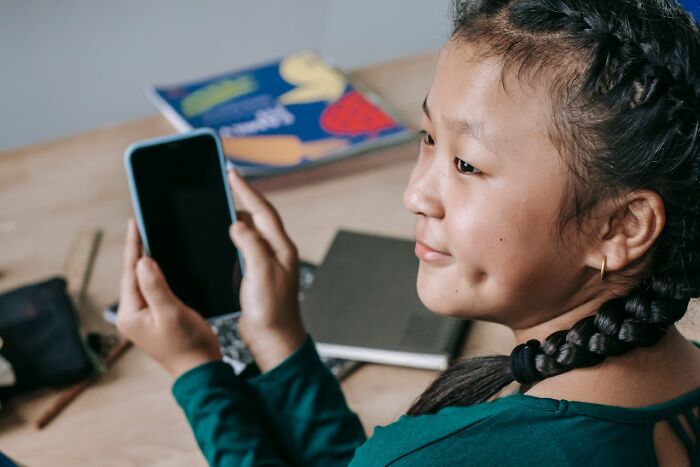 One student asked if she can have a private tutoring session after school so I agreed. Feeling honored and proud that a student is asking for a 1-on-1 session, I was so eager to stay an extra 30 mins after school just for her.
One student asked if she can have a private tutoring session after school so I agreed. Feeling honored and proud that a student is asking for a 1-on-1 session, I was so eager to stay an extra 30 mins after school just for her.
She arrived in the classroom and sat down with her head down. I thought she was sad or had a bad day. I pulled up next to her and opened up with “How’s your day?”
“Not so good, Mr. Lam,” said the student. “My dad is threatening to take away my phone if I don’t make grades.”
“But, you just started 9th grade a few weeks ago. You’re doing okay so far in my class,” I responded.
“It’s not just your class, but all of my classes. If I don’t make grades, my dad will take away my phone and I’ll never get it back.” She said with the look of someone about to lose the most precious thing in life.
I spent the next 30 minutes calming her down about her phone situation, grades, and dad. I was ready to leave, but I wanted to wrap this issue up. I asked her “What’s more important? Grades or phone?”
“My phone.”
I don’t know what it is that made this student so dependent on her phone. I understood how cool it was to even carry a phone when I was in middle school, but this was during the dumb phone era. Nowadays? It’s everywhere. I can’t tell if a student is happy to look down at their seat or just double-tapping that Instagram photo secretly.
I learned that this student prioritizes differently from me. She is more concerned about the phone than grades but she can’t see past what’s in front of her. I wanted to tell her that losing a phone is not the end of the world and she should try to see what her dad was doing - the phone is just motivation to maintain her grades.
After that day, the student did not improve in my class. She stopped asking for help after class. She sat with some distracting students and could not focus. Yes, she also was on her phone a lot in class. I was as much responsible for her demise in my class as anyone around her. I tried talking to her about her grades and poor behavior. It was as if she stopped fearing poor grades and losing phone privileges.
TL;DR: Tried reasoning with a student about grades over phone privileges. Student eventually stopped caring about what anyone thinks of her educational well-being. Nothing more dangerous to a teacher than a student that doesn’t care about herself.
I’m sorry, but cell phones need to be banned unless they have a good legitimate reason.
The harshest truth my students ever taught me is that it’s impossible to be entirely objective while teaching.
Some students are simply more engaged in class.
Some students are incredibly attractive.
Some students are routinely brilliant with their answers.
Some students ask the right questions.
I try my best not to favor such students with more attention than others. In fact, I often go the other way, being much stricter on those I feel a bias toward.
I stop myself returning the smile of the attractive student with an involuntary goofy grin, reserving it for the ones who are left-out in class. I hide the names on answer sheets while grading to prevent myself favoring students who’ve previously written great answers with a more cursory reading, while at the same time preventing myself being more intense on students who’ve given me bad answers before. In a hundred little ways, I try not to let my subconscious feelings translate into an outward bias.
I suppose in many ways being 3–4 years older than my students is tough because I relate to them on so many levels. Preventing this from clouding my judgement is the hardest thing about being a teacher.
since i was not a 'regular' teacher i can't speak as one who instructed young children or teens as my 'students' were incarcerated individuals. however, what i did learn from them was that much of their behavior was either learned or was in response to what they were experiencing. when my son was in high school he would make an occasional comment about certain students that were very judgmental. for example, there was a girl who was promiscuous in her behavior or the boy that was an angry bully. when he would comment i would respond by asking him to think about what could be happening in their lives that made them act like that. maybe the bully's home life was chaotic or violent and his actions were due to him being unhappy or being mistreated. perhaps the girl feels that she isn't loved and, therefore, is confusing sex with true affection. everyone can have a cause/effect situation that no one knows about so we should be kind and not judge.
I spent over thirty years working with kids and families affected by trauma and abuse. Very early on I learned that how a child functions academically has very little to do with intelligence or ability. Sure, a child with a very low IQ may need more help than a child with a normal IQ. But what truly matters is so much greater than academics. I've known kids and adults who did extremely well in school and yet are incapable of emotional health. When a child begins to fail, the most important step is not to berate the kid, but to explore the "why" of the performance. A child who is being abused at home; a child who does not get enough to eat; a child who watches as her parents are abusive to one another or a child living in a chaotic home is most likely going to struggle in school. Never believe that what you see in front of you is 100% of the story. Be compassionate, be honest and be as kind as you can be. You never know what burdens someone else carries.
since i was not a 'regular' teacher i can't speak as one who instructed young children or teens as my 'students' were incarcerated individuals. however, what i did learn from them was that much of their behavior was either learned or was in response to what they were experiencing. when my son was in high school he would make an occasional comment about certain students that were very judgmental. for example, there was a girl who was promiscuous in her behavior or the boy that was an angry bully. when he would comment i would respond by asking him to think about what could be happening in their lives that made them act like that. maybe the bully's home life was chaotic or violent and his actions were due to him being unhappy or being mistreated. perhaps the girl feels that she isn't loved and, therefore, is confusing sex with true affection. everyone can have a cause/effect situation that no one knows about so we should be kind and not judge.
I spent over thirty years working with kids and families affected by trauma and abuse. Very early on I learned that how a child functions academically has very little to do with intelligence or ability. Sure, a child with a very low IQ may need more help than a child with a normal IQ. But what truly matters is so much greater than academics. I've known kids and adults who did extremely well in school and yet are incapable of emotional health. When a child begins to fail, the most important step is not to berate the kid, but to explore the "why" of the performance. A child who is being abused at home; a child who does not get enough to eat; a child who watches as her parents are abusive to one another or a child living in a chaotic home is most likely going to struggle in school. Never believe that what you see in front of you is 100% of the story. Be compassionate, be honest and be as kind as you can be. You never know what burdens someone else carries.

 Dark Mode
Dark Mode 

 No fees, cancel anytime
No fees, cancel anytime 


































